
views
Paris: Seventy years ago, a 12-year-old boy seething with resentment over his treatment in apartheid South Africa was sent to his grandfather in rural India on an anger management course.
The boy, who grew up in an Indian ashram near the city of Durban, had been getting into a lot of fights. White children picked on him because he wasn't white; black children picked on him because he wasn't black.
He started lifting weights and fantasising about revenge — but after two years at the feet of his illustrious "Bapuji", Arun Gandhi, grandson of Mahatma Gandhi, was a teen transformed.
"What my grandfather taught me is that anger is like electricity, it's just as useful and powerful if we use it intelligently but it can be just as deadly and destructive if we abuse it," the US-based activist and author told AFP in an interview on the eve of the 70th anniversary of the assassination of the father of the Indian nation.
MODI 'SHOWMANSHIP'
Arun's arrival in India coincided with the culmination of India's struggle for independence from Britain with its blood-soaked partition into separate Hindu- and Muslim-majority states (India and Pakistan).
Gandhi, a champion of nonviolent resistance who was gunned down by a Hindu extremist on January 30, 1948, was devastated by the bloodshed.
Seven decades later he would be "most unhappy" about the resurgence of Hindu nationalism under Prime Minister Narendra Modi, Arun says. "It's a very vicious cycle there and it's made worse with a right-wing government in power."
Last year, the premier was pictured in a government catalogue sitting Gandhi-style at a spinning wheel, producing cotton. For Arun, who has recently written a book on Gandhi's teachings, "The Gift of Anger", "he is just trying to use Gandhi like everyone else... to gain acceptance by the people."

Prime Minister Narendra Modi spins cotton on a wheel during his visit to Gandhi Ashram in Ahmedabad. (Reuters)
PUMPKIN SOUP AND PLAY
In his book, 84-year-old Arun recalls being "intimidated" by his grandfather when he was shipped off to the Sevagram ashram in central India. "Every morning when I got up I would find a few hundred people standing outside waiting to get a glimpse of him," he said.
But Gandhi was an attentive carer who made time in between negotiations with Indian leaders for pep talks and play with his young charge.
While asceticism was the order of the day – and bland pumpkin soup a staple – the Indian leader enjoyed tomfoolery, such as swinging off two people hoisting up him by the arms like a child.
A year after his return to South Africa the killing of his beloved "Bapuji" hit him hard. "I was absolutely shocked. In the heat of the moment I told my parents I would have throttled the person who did this," the soft-spoken activist who dresses in a dark suit and tortoiseshell glasses recalls.
They encouraged him instead to be the proverbial change he wanted to see.
After 30 years as a journalist, he moved to the US in 1987 and founded the MK Gandhi Institute for Nonviolence. His "turn the other cheek" teachings have found fertile ground in an unusual place: a prison.
Six years after he began running a course in New York State's Groveland prison, violence is down 70 percent, he quotes the governor as telling him recently.
TAKE THE BEATING
World leaders might also benefit from a refresher course in "Satyagraha", Gandhi's brand of nonviolent resistance.
Arun is critical of President Donald Trump, whom he accuses of erasing decades of gains for racial equality in the US. But he also has reproving words for African-Americans who "aggressively demand respect" and for Arab Spring protestors, whom he calls "too angry".
Faced with repression, "you have to keep your hands by your sides and take the beating on the head," he insists – a message Gandhi himself found a hard sell. "The fact is that nobody really wants to follow these great people," Arun says. "The safest thing is to put them on a pedestal and worship them but not follow them."
















Comments
0 comment